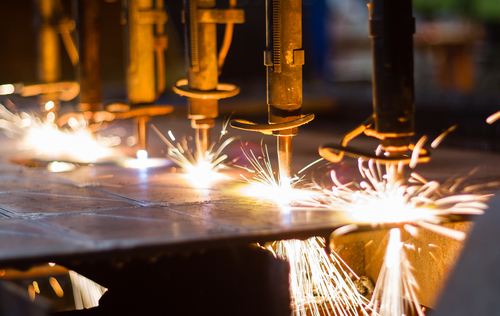Automotive Interiors Expo in Novi, Michigan
From October 22-24, 2019 the Automotive Interiors Expo took place at Novi, Michigan USA. China Certification Corporation was represented by Director Julian Busch and North American Regional Sales Manager Bradley Cronkhite.
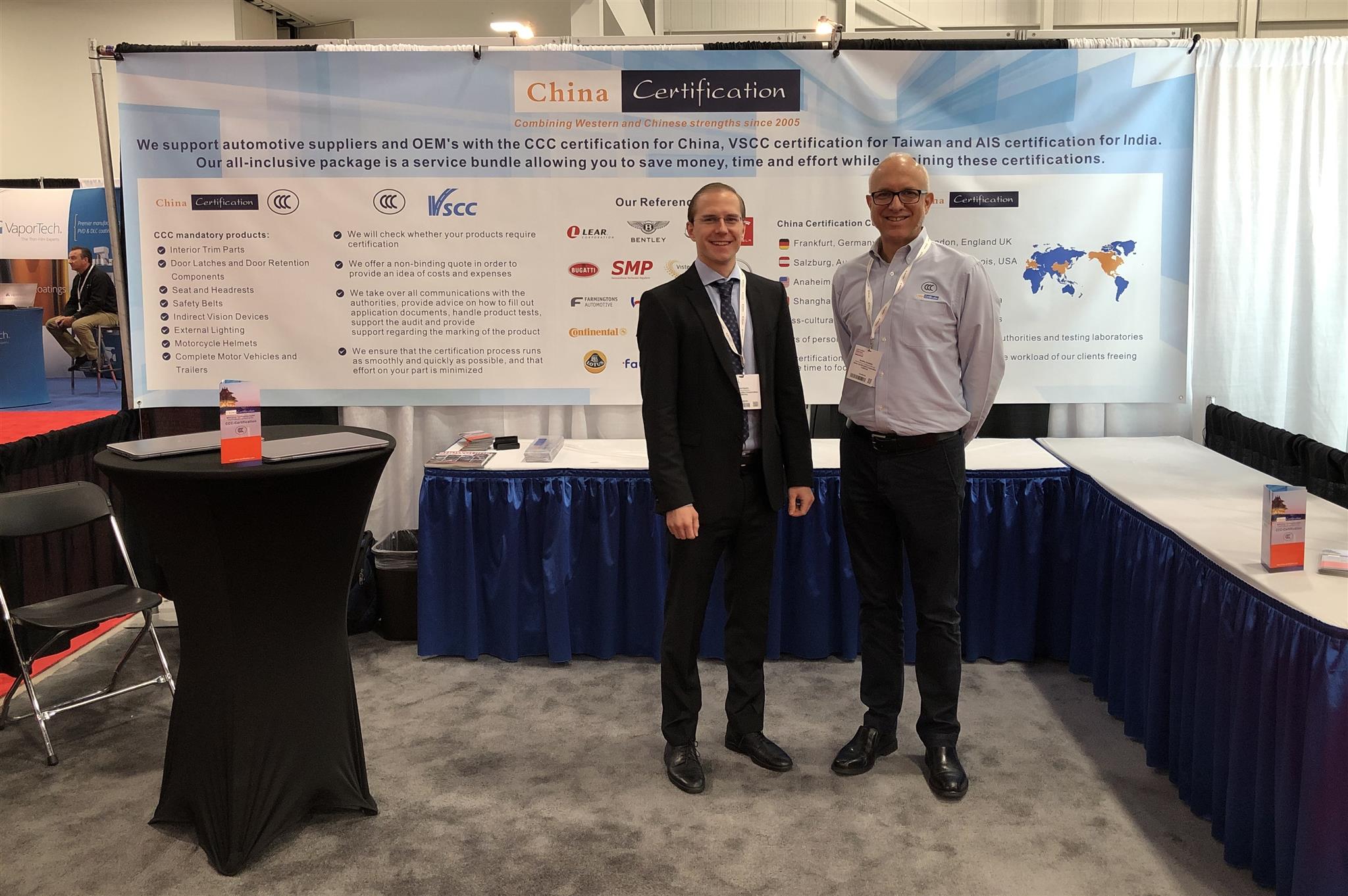
There was an active interaction with current clients and others interested in the CCC certification requirements, process and changes in the CCC certification regulations and process just announced days before.
The show has continued to see visitors enjoying the latest product launches and innovations from over 110 exhibitors, as well as presentations from leading experts at the Future of Automotive Interiors Conference.
The Automotive Interiors Expo was originally started in Europe in 2012. Since then the show has been an important showcase for all aspects of interior trim attended by production managers, quality managers, design teams and procurement people.
For more information on how CCC certification may affect your company, or for more information about CCC certification in general, the process, and the associated costs, please visit our website and our News Section where you will find current updates twice a week.
Please do not hesitate to contact us for further details and consultation. You can contact us via e-mail, or call us (UK: +44 2071931135, Rest of Europe: +49 69 2713769150, US: +1 773 654-2673).
You can also check out our free CCC-Brochure, which can be downloaded right here as a PDF file or you consult our book (in English) “A Brief Guide to CCC: China Compulsory Certification”, which can be found directly here on Amazon.
 |
Author: Julian Busch
Publisher: MPR China Certification GmbH Tel.: +49 69 271 37 69 150 E-Mail: info@china-certification.com |
Transforming CCC Certificates to Voluntary Certificates: CCC Marking for Interior Trim Products Can Remain Until Next Tool Change
In their latest announcement (No. 44, 2019, dated October 17, 2019) the Chinese certification authority CNCA (Certification and Accreditation Administration of the People’s Republic of China) announced that Interior Trimming Products, and Door Locks and Door Retention Components are no longer subject to mandatory CCC certification. These products can still obtain a voluntary CCAP Mark Certification or CQC Mark Certification.
You can find more information regarding the CNCA announcement in our news from October 18, 2019 here.
With the immediate omission of the CCC certification for Interior Trimming Products, and Door Locks and Door Retention Components, these products can no longer obtain a CCC certificate and existing certificates are subject to cancellation.
However, product conformity must still be maintained and demonstrated. For this reason, we recommend the conversion of current CCC certificates into voluntary CQC mark certificates or CCAP mark certificates at the respective certification authorities (CCAP and CQC). This will ensure that the Chinese regulations are fulfilled at all times and simplify the homologation of the complete vehicle and part approval process as well.
The process of voluntary certification is almost identical to the current CCC certification. The only major difference is that instead of the CCC logo, the logo of the respective certification authority (CCAP or CQC logo) should be marked.
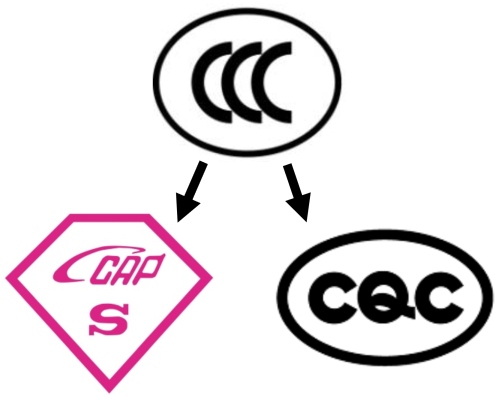
The CCAP (China Certification Centre for Automotive Products Co., Ltd.) has announced on October 28, 2019 that the marking of CCC-certified Interior Trimming Products, and Door Locks and Door Retention Components, can be adjusted with the next regular tool change in the coming years. According to the statement the CCC logo can remain on the parts for now. The CCAP logo can replace the CCC logo with the next regular change of tools or marking within the coming years.
There is no final confirmation from CQC yet regarding the marking. We expect that the marking will be handled similarly.
The current regulation of the product marking allows manufacturers to transform their existing CCC certificates to a voluntary CCAP mark certificates free of charge (for a limited time), with no costs for tool changes. We can assist with the transformation at no cost to you.
To avoid difficulties during the import of your products to China, the change to a voluntary certificate should take place in a timely manner.
Here is a brief video for manufacturers of interior trimming products about the CNCA announcement no. 44, presented by Julian Busch, director of MPR China Certification GmbH / China Certification Corporation:
Here is a brief video about the CQC and CCAP mark certification, presented by Julian Busch, director of MPR China Certification GmbH / China Certification Corporation:
Find more videos on our Video Channel.
Here you can download our brochure about the voluntary CQC and CCAP certification.
Please contact us if you have any questions regarding the new regulations, voluntary certifications or the transformation of CCC certificates.
You can contact us via email, or call us (Europe: +49 69 2713769150, UK: +44 2071931135, US: +1 773 654-2673).
 |
Author: Julian Busch
Publisher: MPR China Certification GmbH Tel.: +49 69 271 37 69 150 E-Mail: info@china-certification.com |
Publication of New GB Standards
The State Administration for Market Regulation (SAMR) approved the update of 20 national GB standards and 2 national standard amendments, which have been already published. It is important to note, that GB standards change frequently.

The update includes some areas that are critical for the automotive industry.
The updating of the standards mentioned below affects current holders of CCC certificates and companies that are in the process of obtaining CCC certification. Therefore, all new CCC certificates must show the current standard by the implementation date at the latest.
The implementation date for the new seat standard GB 15083-2019 is July 1, 2020.
- New number of GB standards
| Number | New number of GB standards | Name of GB Standards | Replaced GB standards | Implementation date |
| 1 | GB 4234.4-2019 | Implants for surgery—Metallic materials—Part 4: Cobalt-chromium-molybdenum casting alloy | GB 17100-1997 | 2021-05-01 |
| 2 | GB 8369.1-2019 | Transfusion sets for single use—Part 1: Gravity feed | GB 8369-2005 | 2021-05-01 |
| 3 | GB 12663-2019 | Intrusion and hold-up systems—Control and indicating equipment | GB 12663-2001 | 2020-11-01 |
| 4 | GB 13851-2019 | Traffic safety signs on inland waterways | GB 13851-2008 | 2020-05-01 |
| 5 | GB 15083-2019 | Strength requirement and test of automobile seats, their anchorages and any head restraints | GB 15083-2006 | 2020-07-01 |
| 6 | GB 15322.1-2019 | Combustible gas detectors Part 1:Point-type combustible gas detectors for industrial and commercial use | GB 15322.1-2003,
GB 15322.4-2003 |
2020-11-01 |
| 7 | GB 15322.2-2019 | Combustible gas detectors Part 2:Household combustible gas detectors | GB 15322.2-2003,
GB 15322.5-2003 |
2020-11-01 |
| 8 | GB 15322.3-2019 | Combustible gas detectors Part 3:Portable combustible gas detectors for industrial and commercial use | GB 15322.3-2003,
GB 15322.6-2003 |
2020-11-01 |
| 9 | GB 15322.4-2019 | Combustible gas detectors Part 4:Line-type optical beam combustible gas detectors for industrial and commercial use | 2020-11-01 | |
| 10 | GB 15810-2019 | Sterile syringes for single use | GB 15810-2001 | 2020-11-01 |
| 11 | GB 16735-2019 | Road vehicle. Vehicle identification number (VIN) | GB 16735-2004 | 2020-01-01 |
| 12 | GB 16737-2019 | Road vehicle. World manufacturer identifier (WMI) code | GB 16737-2004 | 2020-01-01 |
| 13 | GB 18564.1-2019 | Road tanker for dangerous liquid goods transportation. Part1: Technical requirements of atmospheric pressure metal tank | GB 18564.1-2006 | 2020-01-01 |
| 14 | GB 19592-2019 | Detergent additive for motor gasoline | GB 19592-2004 | 2020-05-01 |
| 15 | GB 21340-2019 | The norm of energy consumption per unit products for glass products and cast stone | GB 21340-2013,
GB 29451-2012, GB 30252-2013 |
2020-05-01 |
| 16 | GB 24545-2019 | Requirements and test methods of speed limitation system for motor vehicles | GB/T 24545-2009 | 2020-07-01 |
| 17 | GB 30526-2019 | The norm of energy consumptions for unit product of sintering wall materials and cellular glass | GB 30526-2014 | 2020-05-01 |
| 18 | GB 38189-2019 | Safety of equipment electrically connected to a telecommunication network | 2020-11-01 | |
| 19 | GB 38262-2019 | Flammability of interior materials for buses | 2020-07-01 | |
| 20 | GB 38263-2019 | The norm of energy consumption per unit throughput of cement products | 2020-05-01 |
2. National standard change
| Number | New number der GB Standards | Name of GB Standards | Implementiondate |
| 1 | GB 1523-2013(Modification No. 1) | Sheep wool (Modification No. 1) | 2020-05-01 |
| 2 | GB 27887-2011(Modification No. 1) | Restraining devices for child occupants of power-driven vehicles(Modification No. 1) | 2019-10-14 |
If your product is affected by the GB standard update, please contact us for more information.
We will support you to update your CCC certificate to the new Standard.
You can contact us via email, or call us (Europe: +49 69 2713769150, UK: +44 2071931135, US: +1 773 654-2673).
 |
Author: Julian Busch
Publisher: MPR China Certification GmbH Tel.: +49 69 271 37 69 150 E-Mail: info@china-certification.com |
Omission of Compulsory CCC Certification for Certain Products and Implementation of CCC Self-Declaration for Other Products
In their latest announcement (No. 44, 2019, dated October 17, 2019) the Chinese certification authority CNCA (Certification and Accreditation Administration of the People’s Republic of China) made changes to the CCC certification regulations.
As of October 17, 2019, certain products including automotive “Interior Trimming” and automotive “Door Locks and Door Retention Components” are no longer subject to CCC certification (see Annex 1 for a complete product list).
Automotive “Interior Trimming” and automotive “Door Locks and Door Retention Components” can still obtain voluntary certifications from the CQC and CCAP.
For selected other products, including automotive components such as “Safety Belts, Exterior Lighting and Light Signaling Devices, Seats and Seat Headrests, Indirect Vision Devices and Safety Glass,” the CCC Self-Declaration mode is required and will be the only mode of CCC certification for these products (see Annex 2 for a complete product list).
All products requiring China self-declaration/ China Supplier Declaration of Conformity (SdoC) can still obtain a voluntary CQC mark certification or voluntary CCAP mark certification in addition to the CCC Self-Declaration.
All products requiring China SDoC can still obtain voluntary CQC mark certification or voluntary CCAP mark certification in addition to the required CCC Self-Declaration.
Here is a brief video for manufacturers of interior trimming products about the CNCA announcement no. 44, presented by Julian Busch,
director of MPR China Certification GmbH / China Certification Corporation:
Here is a brief video about the CNCA announcement no. 44 for manufacturers that are affected by the CCC Self-Declaration, presented by Julian Busch,
director of MPR China Certification GmbH / China Certification Corporation:
Omission of Compulsory CCC Certification for Certain Products
With the immediate omission of the CCC certification, affected products (see Annex 1) may no longer obtain a CCC certificate and existing certificates are subject to cancellation. Product conformity however, must still be maintained and demonstrated. For this reason, we recommend the conversion of current CCC certificates into voluntary CQC or CCAP certificates at the respective certification authorities (CCAP and CQC). This will ensure that the Chinese regulations are fulfilled at all times and simplify the homologation of the complete vehicle as well.
The process of voluntary certification is almost identical to the current CCC certification, the only major change would be to replace the CCC logo with the logo of the respective certification authority (CCAP or CQC logo) providing the voluntary certification.
Please read our news regarding the marking of parts that are already certified here.
The transformation of the current CCC certificates to voluntary certificates can be done free of charge within a certain period of time and will be handled by us at no charge during this transition period.
To avoid difficulties during the import of your products to China, the conversion should take place in a timely manner.
For all other questions about the voluntary certification, the application process, audit preparation, change management or certificate extensions, please call or email us. We will be happy to advise you.
The CCC Self-Declaration for Certain Products
Manufacturers of certain products listed in Annex 2 (below) can chose between the traditional certification process at CQC or CCAP and the CCC Self-Declaration until December 31, 2019. However, new certificates with the traditional certification mode can only be issued till December 31, 2019. After this date, applications must be completed with a CCC Self-Declaration. From January 1, 2020, manufacturers must apply for a China CCC Self-Declaration for new products as well as for changes or adjustments to existing products.
Manufacturers must convert their traditional CCC certificates into CCC Self-Declaration certificates by October 31, 2020. Traditional CCC certificates for products mentioned in Annex 2 will be cancelled on November 1, 2020.
In addition to the CCC Self-Declaration of Certification manufacturers can always apply for a voluntary product certification with the CQC or CCAP to ensure and proof the conformity of production to the Chinese regulations.
The CCC Declaration of Conformity is a new process that was first established in 2018, however the Self-Declaration of Compulsory Product Certification must not be confused with an omission of the CCC compliance regulations – all relevant GB standards and CNCA Implementation Rules remain valid and product compliance must continue to be proven during production by conducting annual product tests according to the GB standard. All affected products will still need to be marked with the CCC logo.
The Implementation Rule for the CCC Self-Declaration is CNCA-00C-008: 2018. An online platform managed by CNCA is used for the applications and maintenance of the China SDoC’s. Applicants must register their plants and products and provide information regarding the products and production facility. No factory inspection will be required, but annual product tests will remain a key part of the CCC Self-Declaration. The applicant must be a Chinese subsidiary, importer or dealer of the manufacturer. Please find more information here about the possible impact on the social credit rating of the applicant.
If you do not have a company in China that can act as an applicant, we can assist you with our company foundation package. Here you can find more information.
We can also offer you the placement of a CCC applicant service for the Self Declaration.
You can find more information on this service here.
The Self-Declaration of Compulsory Product Certification has two product types known as “Type A” and “Type B.” Type A products will be allowed to be tested in own or self-determined laboratories, whereas Type B products must be tested in laboratories accredited by the Chinese authority CNAS.
We recommend to stick with the established process with the annual audit by obtaining a voluntary certification in addition to obtaining the CCC Self-Declaration. Going through an annual audit may seem to be more complex and time-consuming, but it gives you and your customers more security since the audit and the process are organized and approved by a Chinese certification authority.
Without annual audits the risk increases significantly that relevant changes to the product, production or plant are not reported to the CNCA. With the audit, process problems and shortcomings can be quickly identified and remedied. In the case of the Supplier Declaration of Conformity, the responsibility and liability lie primarily with the applicant and manufacturer. High penalties and sanctions are expected in the event of violations of the Chinese regulations. It is expected that customs inspections and vehicle inspections will be intensified in order to detect possible problems such as incomplete or incorrect information in the CCC Self-Declaration.
Maintaining the current certification process in cooperation with the Chinese certification authorities as part of the voluntary certification is, in our view, a safer and more risk-averse approach for automotive suppliers and car manufacturers. The CCC SDoC alone does not ensure oversight of the conformity of production and could lead to problems.
Of course, there are also other ways to ensure conformity of production. For example, the manufacturer can perform internal audits in addition to internal testing. We can also support with professional audits and annual product tests.
Here is a brief video about the CCC Self-Declaration, presented by Julian Busch, director of MPR China Certification GmbH / China Certification Corporation:
Here is a brief video about the CQC and CCAP mark certification, presented by Julian Busch, director of MPR China Certification GmbH / China Certification Corporation:
Find more videos on our Video Channel.
Here you can download our detailed brochure about the CCC Self-Declaration.
Here you can download our brochure about the voluntary CQC and CCAP certification.
Please contact us if you have any questions regarding the new regulations, voluntary certifications, the CCC Self-Declaration or the transformation of CCC certificates.
You can contact us via email, or call us (Europe: +49 69 2713769150, UK: +44 2071931135, US: +1 773 654-2673).
Appendix 1
| Number | Name of product | CNCA Implementation Rules | |
| Product category | Sub product category and code | ||
| 1 | Wire and Cables | Wire and cable for railway vehicles with A.C. rated voltage of 3kv and below (0103) | CNCA-C01-01:2014 |
| 2 | Electrical tools | Electric screwdriver and impact wrench (0502) | CNCA-C05-01:2014 |
| 3 | Sanding machine (0504) | ||
| 4 | Circular sa (0505) | ||
| 5 | Electric welder | Small AC arc welder (0601) | CNCA-C06-01:2014 |
| 6 | AC arc welder (0602) | ||
| 7 | Submerged arc welding machine (0606) | ||
| 8 | Plasma arc welder (0608) | ||
| 9 | Arc welding transformer anti-shock device (0609) | ||
| 10 | Welding cable coupling device (0610) | ||
| 11 | Resistance welder (0611) | ||
| 12 | Audio and video equipment | Tuning receiver, radio for various broadcast bands (0804) | CNCA-C08-01:2014 |
| 13 | Monitor (0809) | ||
| 14 | Motor vehicle and safety accessories | Automotive interior parts (1111) | CNCA-C11-09:2014 |
| 15 | Car door locks and door hinges (1112) | CNCA-C11-10:2014 | |
| 16 | Safety glass | Railway vehicle safety glass (1303) | CNCA-C13-01:2014 |
| 17 | Telecommunications terminal equipment | Fixed telephone terminal and telephone add-on devices (1603) | CNCA-C16-01:2014 |
| 18 | Group phone (1605) |
Appendix 2
| Number | Name of product | CNCA Implementation Rules | Procedure A/B | Remark | |
| Product category | Sub product category and code | ||||
| 1 | Electrical tools | Electric drill(0501) | CNCA-C05-01:2014 | Self-declaration procedure A (Type test in optional laboratory + self-declaration) | Newly added |
| 2 | Electric grinder(0503) | Newly added | |||
| 3 | Electric hammer(0506) | Newly added | |||
| 4 | Electric welder | DC arc welder(0603) | CNCA-C06-01:2014 | ||
| 5 | TIG arc welder(0604) | ||||
| 6 | MIG/MAG arc welder(0605) | ||||
| 7 | Plasma arc cutting machine (0607) | ||||
| 8 | Circuit switch and electrical device for protection or connection | Thermal fuses(0205) | CNCA-C02-01:2014 | Self-declaration procedure B (Type test in designated laboratory + self-declaration) | Newly added |
| 9 | Cartridge fuse-links of miniature fuses(0207) | Newly added | |||
| 10 | low-voltage apparatus | Leakage protector (0306) | CNCA-C03-02:2014 | Newly added | |
| 11 | Circuit breaker(0307) | Newly added | |||
| 12 | Fuse(0308) | Newly added | |||
| 13 | Low-voltage switchgear (disconnectors, switch-disconnectors and fuse-combination units)0302) | Newly added | |||
| 14 | Other circuit protection devices(0304, 0307, 0309) | Newly added | |||
| 15 | Relay(0303) | Newly added | |||
| 16 | Other switches(0305) | Newly added | |||
| 17 | Other device(0304, 0305) | Newly added | |||
| 18 | low-voltage switchgear assemblies (0301) | CNCA-C03-01:2014 | |||
| 19 | Low power motor | Low power motor (0401) | CNCA-C04-01:2014 | ||
| 20 | Equipment for Household and similar uses | Motor-compressor(0704) | |||
| 21 | Motor vehicle and safety accessories | Car seat belt (1104) | CNCA-C11-04:2014 | Newly added | |
| 22 | Motor vehicle exterior lighting and light signal devices (1109, 1116) | CNCA-C11-07:2014 CNCA-02C-065:2005 | Newly added | ||
| 23 | Car seat and seat headrest (1114) | CNCA-C11-12:2014 | Newly added | ||
| 24 | Motor vehicle indirect vision device (1110, 1115) | CNCA-C11-08:2014 CNCA-02C-064:2005 | |||
| 25 | Car drive recorder (1117) | CNCA-C11-14:2014 | |||
| 26 | Car reflecting marking(1118) | CNCA-C11-13:2014 | |||
| 27 | Safety glass | Car safety glass (1301) | CNCA-C13-01:2014 | Newly added | |
| Information technology equipment, Audio and video equipment | Equipment with rated voltage less than or equal to 5VDC, rated power consumption less than 15W (or 15VA) and no rechargeable battery (class III equipment) | CNCA-C09-01:2014 CNCA-C08-01:2014 | Self-declaration procedure A (Type test in optional laboratory + self-declaration) |
Renault presents an extremely low-cost electric vehicle in China
The Renault K-ZE, a small electric city vehicle, was designed from the scratch for the Chinese and Indian markets. Presented as a concept car at the Paris Motor show in autumn 2018, Renault already promised a range of 250 km at that time and that the K-ZE targets the Chinese market for small and urban vehicles. From an exterior perspective, the K-ZE is a compact SUV-style electric vehicle, based on the Renault and Nissan CMF-A platform which already serves for the Renault Kwid and Datsun Redi-Go offered in India.

In China, the model is available in three different versions. The basic version costs less than 8,000 Euros, a medium version 66,800 Yuan (approx. 8,500 Euros) and the top version with full equipment 71,800 Yuan (approx. 9,140 Euros). Renault has not yet announced more information on the respective technical details of the three variants. What they all have in common is a 33 kW drive with 125 Nm torque and a 26.8 kWh battery for a range of up to 271 kilometres. Charging can be by AC domestic socket as well as DC quick charging according to the Chinese GB/T standard at designated charging stations. The energy consumption is stated at 10.8 kWh per 100 kilometres, the maximum speed is 105 km/h.
Even though the vehicle is primarily intended for the Chinese market, Renault emphasizes that the K-ZE has been developed according to European standards. Previously, the similar Renault Kwid lead to negative headlines in India and South Africa because it received zero stars for the NCAP crash test and cannot be sold in Europe due to a lack of safety features such as airbags and ABS. If the K-ZE will be successful in China, Renault will consider introducing it on other global markets. In Europe, the small car is unlikely to be available at such a low price, but India and other Asian countries have a better chance of getting the compact electric SUV at an affordable price.
The Renault K-ZE will be manufactured as the first series vehicle of the newly founded joint venture eGT New Energy Automotive. The companies involved are the Renault-Nissan-Mitsubishi Alliance and the Chinese car manufacturer Dongfeng. The small electric car marks the start of an push for more such vehicles in China. Renault plans to introduce nine passenger car models, including three electric vehicles, for the Chinese market by 2022 and to sell 550,000 vehicles annually. Numerous automobile manufacturers in China import components from abroad. Are you part of the automotive business and need to supply your parts to the Chinese market? We will be happy to advise you on the China Compulsory Certification (CCC), which is a mandatory requirement.
For more information on how CCC certification may affect your company, or for more information about CCC certification in general, the process, and the associated costs, please visit our website and our News Section where you will find current updates twice a week.
Please do not hesitate to contact us for further details and consultation. You can contact us via e-mail, or call us (UK: +44 2071931135, Rest of Europe: +49 69 2713769150, US: +1 773 654-2673).
You can also check out our free CCC-Brochure, which can be downloaded right here as a PDF file or you consult our book (in English) “A Brief Guide to CCC: China Compulsory Certification”, which can be found directly hier on Amazon.
 |
Author: Julian Busch Publisher: MPR China Certification GmbH Tel.: +49 69 271 37 69 150 E-Mail: info@china-certification.com Web: www.china-certification.com
|
Automotive companies face new challenges with more electric vehicles in the market
After about a decade of development work for the established car manufacturers, electric vehicles are ready for series production and are offered on the mass market. Now the hard work begins for the manufacturers: to find new buyers for their vehicles. Mr. Herbert Diess, Chairman of the Board of Management of the Volkswagen Group, called during a speech at the IAA 2019 in Frankfurt Germany, on governments to switch off coal-fired power plants and to focus on environmentally friendly energy sources and transportation solutions. At the fair, Volkswagen presented the ID3, an affordable electric vehicle suitable for everyday use for the broad mass of the people.
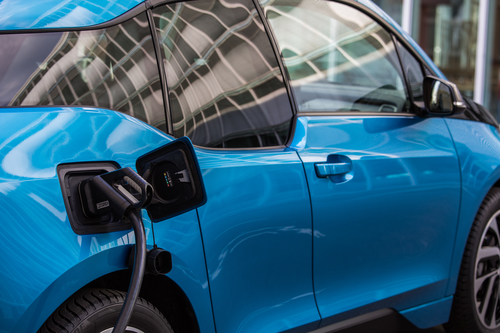
So far, car buyers have been relatively reluctant to purchase an electric vehicle as a new car. Many customers are concerned about the reliability and range, a sufficient network of power charging stations and the usually higher price of the electric drive compared to a conventional combustion engine. Currently, electric vehicles are mainly sold in markets or countries that subsidize them. Demand in China, the world’s largest market for electric vehicles, fell by a drastic 16 percent in August 2019 for the second month in a row after the government cut subsidies. Other markets have been hit similarly, such as Denmark’s electric vehicle market in 2016 after the government did not renew tax relief.
According to a car industry analyst, it has been talked about electric vehicles for a long time, but this year the first mass-produced models are appearing on the market. However, sales of plug-in hybrids and electric vehicles in Europe so far account for only 2 percent of newly registered vehicles. Many car manufacturers have no choice but to offer more environmentally friendly engines to meet the stricter emission requirements for their vehicle fleets. The Volkswagen ID3 could turn around the market and make electric drives more interesting. Volkswagen hopes to find many new buyers for this model with a base price of less than 30,000 euros and a range of up to 330 kilometres, which makes careful route planning and charging stops unnecessary for most common distances. In addition, the Ionity consortium consisting of Daimler, VW, Ford, BMW and recently joined Hyundai, increased its efforts to complete its network of 400 super-charging stations across Europe by next year. Meanwhile, the German government discussed further climate protection measurements which lead to hopes of German car manufacturers for higher subsidies. Despite the slight declines, China continues to be the largest sales market for electric vehicles alongside Germany and Europe. China therefore still is important for car manufacturers and suppliers who want to export their products to that market. This requires the obligatory China Compulsory Certification (CCC), for which we would be happy to advise you.
For more information on how CCC certification may affect your company, or for more information about CCC certification in general, the process, and the associated costs, please visit our website and our News Section where you will find current updates twice a week.
Please do not hesitate to contact us for further details and consultation. You can contact us via e-mail, or call us (UK: +44 2071931135, Rest of Europe: +49 69 2713769150, US: +1 773 654-2673).
You can also check out our free CCC-Brochure, which can be downloaded right here as a PDF file or you consult our book (in English) “A Brief Guide to CCC: China Compulsory Certification”, which can be found directly here on Amazon.
 |
Author: Julian Busch
Publisher: MPR China Certification GmbH Tel.: +49 69 271 37 69 150 E-Mail: info@china-certification.com |
Brake Products such as brake pads will be Required to Obtain CCC Certification
The highest-ranking Chinese market regulatory body State Administration for Market Regulation (SAMR) announced changes to the mandatory certification catalogue. Along with changes to the production licensing system, the authority also stipulated that specific brake products will also be required to obtain CCC certification as part of an extension of the product catalogue for mandatory CCC certification.
Several different brake products will fall in the certification scope in the future. These include brake discs, brake pads, brake linings and brake blocks. The applicable standard is GB 5763-2018, which was implemented on October 1, 2019.
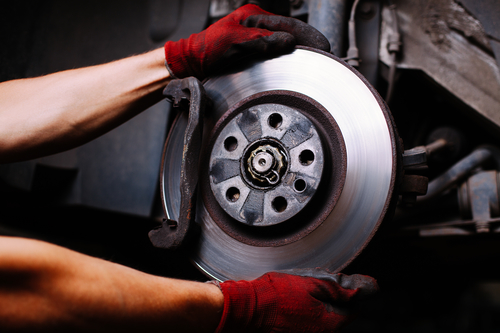
The CCC process requires submitting application documents, supporting documentation, product tests at a CNAS-accredited test lab in China and a factory inspection. After a certificate has been issued, it is the company’s responsibility to ensure that the marking of the product with the CCC-logo conforms to Chinese regulations. An annual follow-up factory audit will also be required each year to maintain compliance.
For more information on how CCC certification may affect your company, or for more information about CCC certification in general, the process, and the associated costs, please visit our website and our News Section where you will find current updates twice a week.
Please do not hesitate to contact us for further details and consultation. You can contact us via e-mail, or call us (UK: +44 2071931135, Rest of Europe: +49 69 2713769150, US: +1 773 654-2673).
You can also check out our free CCC-Brochure, which can be downloaded right here as a PDF file or you consult our book (in English) “A Brief Guide to CCC: China Compulsory Certification”, which can be found directly hier on Amazon.
 |
Author: Julian Busch Publisher: MPR China Certification GmbH Tel.: +49 69 271 37 69 150 E-Mail: info@china-certification.com Web: www.china-certification.com
|
New GB standard for CCC certification of car seat and headrest
Until now there is no official announcement from the certification authorities, but according to an internal announcement of CCAP a newly revised standard GB 15083-2019 will come into effect on January 1, 2020 and will replace the old standard GB 15083-2006. The new standard will be GB 15083-2019. Manufacturers of these products need to comply with the new standard, adjust their ongoing certification process and get their products re-tested if required.
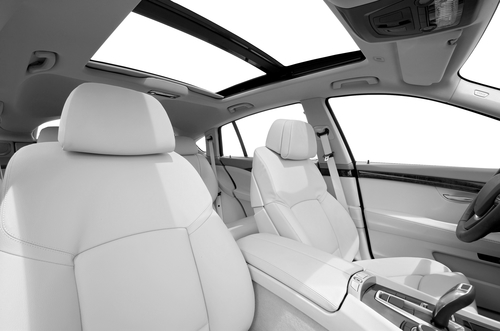
Once the new GB Standard GB 15083-2019 is implemented, all certificate changes and new CCC certifications have to be in compliance with the new standards. Certificate Holders whose products are based on the old GB Standard must submit an application to update their products and may need to re-test in accordance with the new GB standard. If there is no application for modification, existing CCC certificates will be temporarily suspended by the Chinese authority. If the application for modification is not made, the certificate will be cancelled.
Once the new standard has been officially announced we will update you with further details and change requirements.
Are you unsure whether your seats meet the requirements of the new GB standard or are you interested in upgrading to Chinese standards? Then contact us for more details and a detailed consultation. Write us an email or call us on +49-69-2713769150.
You can also visit our website for more information about CCC certification in general, the process, and the associated costs. We will also introduce you in detail to our CCC certification package and you can get an overview of our references.
You can also check out our free CCC-Brochure, which can be downloaded right here as a PDF file or you consult our book (in English) “A Brief Guide to CCC: China Compulsory Certification”, which can be found directly here on Amazon.
Adjustment of the catalogue of Production License for Industrial Products
The State Council of the People’s Republic of China has adjusted the existing catalogue of production licenses for industrial products for numerous products with Announcement No. 19 of 8 September 2019. The aim is to strengthen the supervision during and after the production of certain products, in particular industrial products.
The Production License for Industrial Products is one of the most important product quality control licenses in the PR China and covers a wide range of products. Companies that only produce, sell and operate in China require production licenses and are directly supervised by the State Administration for Market Regulation (SAMR). Similar to the CCC certification, there is a specific product catalog for the production licenses of industrial products. The Production License for Industrial Products requires a more comprehensive assessment of product quality, while CCC requires an evaluation of product safety in the foreground. The two systems are independent of each other.
According to the announcement, some products from the catalog of Production License for Industrial Products may be required to convert to the CCC certification.
Overview:
- Canceling the need for the Production License for Industrial Products of 13 types of products such as internal combustion engines and automobile brake fluids
- Introduction of the CCC certification requirement for brake pads products for motor vehicles
- Combining the two types of products of satellite TV broadcasting ground receiving equipment and radio broadcasting and television transmitting equipment into one category
- Products regarding the safety, health and environmental protection will need China Compulsory Certification (CCC) in the future.
Catalogue of Production Licenses for Industrial Products cancellation and merger management
(15 categories in total)
| Number | Product name | Current implementing agency | Adjustment |
| 1 | Bearing steel | State Administration for Market Regulation (SAMR) | Production License Cancelled |
| 2 | Anti-counterfeiting technology products | Provincial market supervision and administration department | Production License Cancelled |
| 3 | Friction materials and sealing products* | Provincial market supervision and administration department | Production License Cancelled |
| 4 | Highway bridge support | Provincial market supervision and administration department | Production License Cancelled |
| 5 | Internal combustion engine | Provincial market supervision and administration department | Production License Cancelled |
| 6 | Grinding wheel | Provincial market supervision and administration department | Production License Cancelled |
| 7 | Wire rope | Provincial market supervision and administration department | Production License Cancelled |
| 8 | Prestressed concrete steel | Provincial market supervision and administration department | Production License Cancelled |
| 9 | Prestressed concrete sleeper | Provincial market supervision and administration department | Production License Cancelled |
| 10 | Special personal protective devices | Provincial market supervision and administration department | Production License Cancelled |
| 11 | Refractory material | Provincial market supervision and administration department | Production License Cancelled |
| 12 | Building waterproofing membrane | Provincial market supervision and administration department | Production License Cancelled |
| 13 | Motor vehicle brake fluid | Provincial market supervision and administration department | Production License Cancelled |
| 14 | Satellite television broadcasting ground receiving equipment | State Administration for Market Regulation (SAMR) |
Cancellation of units such as the outdoor unit, combined with the Radio broadcasting and television transmitting equipment into a broadcast television transmission device |
| 15 | Radio broadcasting and television transmitting equipment | State Administration for Market Regulation (SAMR) | Cancellation of transmitting antennas and other units, combined with satellite television broadcasting ground receiving equipment into broadcast television transmission equipment |
* The Brake pad products in “Friction Materials and Sealing Products” need to be converted to compulsory product certification (CCC certification) after completion of relevant procedures. Production license for brake pad products is still implemented before completion of the relevant procedures.
Therefore, after complete implementation of this announcement, there will be a obligation to obtain a CCC certificate for brake pads, brake linings, brakes, disc brakes and braking clogs.
Catalogue of Production Licenses for Industrial Products after adjustments
(10 categories in total)
| Serial number |
Product name |
Implementing agency |
| 1 | Steel reinforcement for construction | State Administration for Market Regulation (SAMR) |
| 2 | Cement | State Administration for Market Regulation (SAMR) |
| 3 | Broadcast television transmission equipment | State Administration for Market Regulation (SAMR) |
| 4 | Counterfeit RMB banknote discriminating device | State Administration for Market Regulation (SAMR) |
| 5 | Prestressed concrete railway bridge simply supported beam | State Administration for Market Regulation (SAMR) |
| 6 | Wire and Cable | Provincial market supervision and administration department |
| 7 | Hazardous Chemicals | Provincial market supervision and administration department |
| 8 | Hazardous chemicals packaging and containers | Provincial market supervision and administration department |
| 9 | Fertilizer | Provincial market supervision and administration department |
| 10 | Materials or other related products that have direct contact with food | Provincial market supervision and administration department |
The State Council emphasized the importance of this announcement and urges enterprises to effectively assume the responsibility of quality and safety management and ensure that products comply with relevant standards.
For more information on how CCC certification may affect your company, or for more information about CCC certification in general, the process, and the associated costs, please visit our website and our News Section where you will find current updates twice a week.
Please do not hesitate to contact us for further details and consultation. You can contact us via e-mail, or call us (UK: +44 2071931135, Rest of Europe: +49 69 2713769150, US: +1 773 654-2673).
You can also check out our free CCC-Brochure, which can be downloaded right here as a PDF file or you consult our book (in English) “A Brief Guide to CCC: China Compulsory Certification”, which can be found directly here on Amazon.
During the Golden Week Holiday Chinese Authorities are Closed
Tuesday, October 1, 2019 is a National Holiday in China, which also marks the beginning of the Golden Week. Chinese authorities will be closed which means certification processes will be delayed. On October 8, 2019 the authorities will be back to work.

This year the National Holiday is also marking the 70th anniversary of the Peoples Republic of China. All parts of the country will celebrate this occasion and a military parade will be held in Beijing.
A lot of Chinese uses the Golden Week as a great opportunity to travel since there will be no motorway tolls. Therefore, there will be intense traffic and a high usage of public transport.
The Golden Week has been a National Holiday since 1999. It was implemented to promote the country’s tourism industry, rise the living standard and give people the opportunity to visit relatives that live in other regions of China.
MPR China Certification and China Certification Corporation will be open for business as usual, and we will do our best to work with the Chinese Test labs and Chinese Authorities to minimize the impact and delays for our clients.
With our offices in Germany, the U.S. and China (Beijing, Shanghai and Guangzhou) we will support you throughout your certification process. Our goal is to minimize the effort and costs for our clients, while maximizing the efficiency and accuracy of the paperwork, process and factory inspection.
If you would like more Information regarding CCC certification, please visit our website. Here you can learn more about the certification process and the costs associated with certification. You will also find details regarding our certification package on our website including a general anticipated time frame. Take a look at our references section to see some of our clients and what they are saying about us. For more detailed information please download our free booklet “CCC Made Easy” here. You may also consider our book “A Brief Guide to CCC: China Compulsory Certification”, which can be ordered directly on Amazon here.
Please do not hesitate to call or email with any questions you may have.



